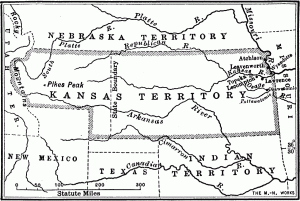In June of 1857, shortly before his 33rd birthday, D.R. Anthony returned to Kansas for good. He settled in Leavenworth, in the northeast corner of the territory. Kansas looked quite different as a Territory than it does today. It would gain the rectangular lines we know today at the expense of some of modern-day Colorado.
By this time the fight between the free-state and pro-slavery factions, begun in 1854, had entered a new and deadly phase. By 1855, pro-slavery men were patrolling the Kansas-Missouri border. They “halted westbound steamers and subjected emigrants to Kansas to a searching interrogation,” turning back those suspected of anti-slavery beliefs (Starr, 1973,8). Northern settlers found themselves targets of vandalism, threats, and wholesale destruction of property. One of the most infamous incidents was the attack by a small pro-slavery “army” on the Free State hotel (built by the Emigrant Aid Society) in Lawrence, KS on May 21, 1856. Called the “Sack of Lawrence,” this event grew in free-state accounts from a symbolic attack on a hotel to an all-out rampage of destruction and murder. It also gave new impetus to the cause of the free-stater, particularly the Brown brothers and their militia, the Pottawatomie Rifles, who brutally murdered several pro-slavery men. The battle would rage until 1861, when Kansas was declared a free state.
For more on the complex history of Bleeding Kansas see:
“Bibliography on Bleeding Kansas” (Kansas State Historical Society)
“Disunion” (NY Times)
Etcheson, Nicole. Bleeding Kansas : Contested Liberty in the Civil War Era. Lawrence: University Press of Kansas, 2004.
Freedom’s Frontier National Heritage Area
House Divided Project (Dickinson College)
Mullis, Tony R. Peacekeeping on the Plains : Army Operations in Bleeding Kansas. Columbia: University of Missouri Press, 2004.
Anthony arrived in the midst of the battle over Slavery in June of 1857, and did not hesitate to pick a side. In an August, 1857 letter to his brother-in-law Aaron McLean, he declared “Time will tell the story and Kansas will be free, although the Pro-slavery still cling to the idea of a slave state.” In the same letter he praised the Free-Staters for boycotting the Lecompton Constitution, which had seen fraudulent voting by pro-slavery Missourians near the Kansas border who crossed over by the thousands to swell the vote in favor of slavery. Anthony also praised Governor R.J Walker for recognizing the fraud (Etcheson, 2004, chs 7,8).
In a later description to his Susan of the political athmosphere of Kansas, Anthony had this to say:
“The Pro-Slavery Border Ruffian Democracy never attack a man here who says he will defend himself. So I have been compelled to wear a knife and carry a Colt’s revolver, and the consequence is no trouble will be made on my account. The hounds never attack a man singlehanded. They are cowardly and dishonorable in all of their intercourse with Free State men. The Pro-slavery businessmen here are a better class of men. They denounce the bullying course of some of their party but dare not speak for fear of losing their own standing. When Kansas comes in free a large number of these scoundrels will then leave the country and Kansas will then boast of as good a population as any state or territory.”
It did not take Anthony long to make a reputation as one of the most adamant anti-slavery voices. His words of caution to his sister would prove prophetic. He wrote home on October 10, 1859, to report to his family that on October 3, he had been attacked by three men, one of whom sustained a knife wound (Langsdorf and Richmond, eds, Kansas Historical Quarterly, 1958, 222). Anthony was unhurt, and believed another attack unlikely to occur.
Another incident involving Anthony made headlines throughout the state. On January 19, 1859, Charles Fisher, an escaped slave working as a barber in Leavenworth, was arrested by two men. U.S. Marshals “Harrison and Campbell” took him across the Missouri river to return him in accordance with the Fugitive Slave Laws. During the night however, Fisher was able to escape back to Kansas and was taken to safety by a group that included D.R. Anthony (Etcheson, 204 and Starr, 57). Anthony also spoke out in meetings against Fisher’s arrest (left).
This incident is critically important because it is an extreme representation of a change of heart in the beliefs of the Free-State party. Nicole Etcheson describes an evolution in the Free-Staters’ mindset from 1855 and ’56 where Blacks were unwelcome and sometimes returned to Missouri, to 1859-60 where “many white Kansans looked the other way as runaways came to the territory, and some openly aided their flight” (Etcheson, 205). The latter group certainly included Daniel Read Anthony. Anthony and his cohorts had aided the escape of a man in the custody of U.S. Marshals, who were of course an agency of the Federal Government. As such, it should come as no surprise that Anthony was among those indicted for helping Fisher. The group was later acquitted (Starr, 57; Etcheson, 205), but as tensions rose during the spring and summer of 1860, Anthony prophesied “war in Kansas as never before witnessed.”
Having laughed in the face of the Fugitive Slave Act once already, D.R. Anthony would do so again when he served the Union for a brief, but colorful period during the Civil War.
Sources:
Etcheson, Nicole. Bleeding Kansas : Contested Liberty in the Civil War Era. Lawrence: University Press of Kansas, 2004.
Richmond and Langsdorf (eds) . “Letters of Daniel R. Anthony, 1857-1862 – Continued.” Kansas Historical Quarterly 24, no. 2 (1958).
Starr, Stephen Z. Jennison’s Jayhawkers. Baton Rouge, LA: Lousisiana State Univ. Press, 1973.


